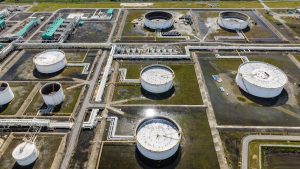Malaysia’s Prime Minister Anwar Ibrahim says that his country will not bow to demands from Beijing to stop its oil and gas exploration in the South China Sea, after the publication of a leaked diplomatic note from Beijing stating that it was infringing on Chinese territory.
In a news conference in Vladivostok, Russia, where he is currently on an official visit, the Malaysian leader continued to explain his government’s stance following China’s accusations in a protest note in February to the Malaysian Embassy in Beijing that Kuala Lumpur had infringed on its territory.
“We have never intended in any way to be intentionally provocative, unnecessarily hostile,” Anwar said, the Associated Press reported. “China is a great friend, but of course we have to operate in our waters and secure economic advantage, including drilling for oil in our territory.”
Anwar’s comments follow the publication of a leaked diplomatic note that China sent to the Malaysian embassy in Beijing on February 18, demanding that Malaysia immediately halt all oil and gas exploration activities off the coast of Sarawak State.
The note was published by the Philippine Daily Inquirer on August 29 under the headline “Malaysia gets taste of China West Philippine Sea bullying.” In the document, China’s government expressed “serious concern” and “strong dissatisfaction” over Malaysia’s oil and gas exploration activities near Luconia Shoals, which are known as Gugusan Beting Raja Jarum in Malaysia and as Nankang Ansha and Beikang Ansha in China. Beijing accused Malaysia of encroaching on areas covered by its “10-dash line” maritime claim.
“The Chinese side, once again, urges the Malaysian side to genuinely respect the territorial sovereignty and maritime interests of China [and] immediately stop the above mentioned activity,” the note reportedly said.
Two weeks after Beijing issued the diplomatic note, Anwar made a speech in Melbourne in which he complained about alleged pressure by the United States for Southeast Asian nations to take sides in its geopolitical competition with China.
“If they have problems with China,” The Star reported him saying, “they should not impose them upon us. We do not have a problem with China.”
Earlier this week, Malaysia’s Foreign Ministry said in a statement that it was investigating the leak of the diplomatic note, which it described as a matter of “grave concern.” The Inquirer report claims that it obtained the document from “a Malaysian journalist who requested anonymity.”
The Malaysian Foreign Ministry added that Malaysia’s position on the South China Sea “remains unchanged” and that Malaysia would “continue to defend its sovereignty, sovereign rights, and interests in its maritime areas.”
Malaysia has been exploring for oil and gas off the Sarawak coast since 1974, when the government incorporated the state-owned energy company, Petronas, and granted it the rights to explore and produce oil and gas in the offshore areas lying within Malaysia’s territorial waters. It later extended this to include Malaysia’s Exclusive Economic Zone (EEZ), which extends 200 nautical miles into the South China Sea from the coast of Sarawak.
Around a decade ago, however, Beijing began dispatching the China Coast Guard to the area around Luconia Shoals, where they have maintained a frequent presence since, harassing Malaysian drilling rigs and survey vessels.
The leak of the diplomatic note is embarrassing for Anwar’s administration, adding to perceptions that it had failed to confront China sufficiently over its aggressive patrols inside Malaysia’s EEZ.
In April of last year, Anwar attracted considerable domestic criticism when he addressed parliament following a state visit to China. He told lawmakers that Chinese officials had expressed concerns about Petronas’ involvement in the Kasawari gas field, around 25 nautical miles to the southeast of Luconia Shoals, where Malaysia recently completed its largest offshore gas platform.
Anwar then said he was open to negotiations with Beijing over disputed areas. “If the condition [from Beijing] is that there must be negotiation, then we are ready to negotiate,” Anwar said, according to Reuters.
As Ganesh Sahathevan noted in these pages in May, this appeared to mark a break with past administrations, which “never spoke of negotiations with China as an avenue for addressing disputes in the South China Sea.” Instead, they “pursued a policy of asserting sovereignty by building its [Malaysia’s] own installations in the South China Sea while using international instruments… to defend its claims.”
The comments prompted considerable controversy. Anwar’s opponents describing his comments as “reckless,” while others called for the government to adopt a more robust approach to the South China Sea. “Malaysia must make use of its diplomatic tools,” one writer later argued in the Business Times. “Do not remain quiet when such harassment occurs Make it public and send protest notes. At least the public will know who is putting the country’s economy at risk.”
The Foreign Ministry was eventually forced to state that the country’s position on the South China Sea was “consistent and remains unchanged.”
As the Washington Post noted in an investigation in May, the pending exhaustion of the oil and gas reserves in the shallow waters close to Malaysia’s shores are increasing its reliance on new “deepwater” fields in more remote parts of its EEZ, where Petronas has awarded a raft of new exploration permits since 2021. This has raised the likelihood of “direct confrontation with Chinese forces in the South China Sea.”
Malaysia has so far managed successfully to quarantine its maritime disputes with China from other productive areas of the relationship; it is for this reason that it chose not to publicize the diplomatic protest note sent by the Chinese government in February. In so doing, Malaysia has avoided the sort of retaliation that has been experienced in recent months by the Philippines – but at the cost of appearing to accept a near-constant Chinese presence within waters that it claims under international law.
With its existing oil and gas projects running down, and Chinese pressure in its EEZ growing, it remains to be seen how Kuala Lumpur can continue to sidestep some sort of confrontation.

































